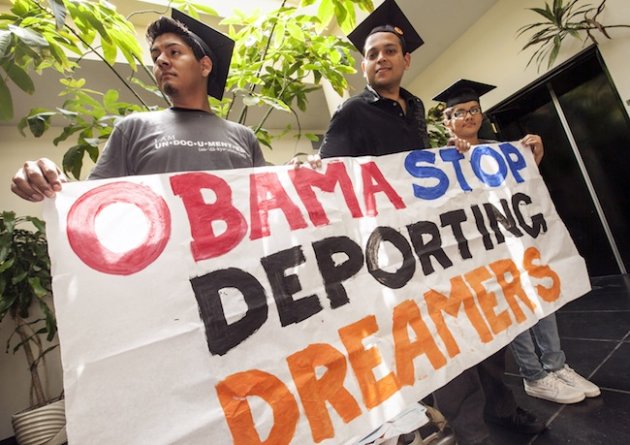http://www.yahoo.com/_ylt=AsGr0xLshovzlFTUvRSKVqibvZx4;_ylu=X3oDMTUwbjJtbWttBGEDMTIwNjE1IG5ld3MgZGVwb3JhdGlvbiB0BGNjb2RlA3B6YnVhbGxjYWg1BGNwb3MDMQRnA2lkLTIzNzE5OTYEaW50bAN1cwRtY29kZQNwemJ1YWxsY2FoNQRtcG9zAzIEcGtndAM0BHBrZ3YDMgRwb3MDMgRzZWMDdGQtbndzBHNsawN0aXRsZQR0ZXN0AzcwMQR3b2UDMTI3NzUxNTA-/SIG=142ra73pt/EXP=1339860919/**http%3A//news.yahoo.com/blogs/ticket/report-white-house-halt-deportation-young-illegal-immigrants-133800284.html White House to halt deportation of young illegal immigrants

By
Liz GoodwinNational Affairs ReporterBy
Liz Goodwin |
The Ticket – 1 hr 50 mins ago

Student protesting outside an Obama campaign office. (Damian Dovarganes/AP) The White House will halt the deportation of as many as 800,000 young illegal immigrants and in some cases give them work permits, in a sweeping new initiative announced by the Department of Homeland Security.
People under 30 who entered the country illegally or overstayed their visas when they were under the age of 16 will be immune from deportation if they have not committed a significant misdemeanor or felony and have graduated from a U.S. high school or joined the military. They can apply for a renewable two-year work permit that won't provide a path to citizenship but will allow them to work legally in the country.
Homeland Security Secretary Janet Napolitano told reporters on Friday that she believed the move "is the right thing to do," and will help the agency focus on deporting criminals. "It is not immunity, it is not amnesty," she said. "It is an exercise of discretion so that these young people are not in the removal system."
Young people will have to proactively apply and pay for the temporary legal status at a local United State Citizenship and Immigration Services office. If the deferred status is granted, they can apply for a work permit.
"I wouldn't say we are encouraging people to step forward," an Obama administration official told reporters. "We are making a process available and people can make their own decision."
President Obama will address the change in a speech at 1:15 pm.
Young people who were brought into the country illegally or overstayed their visas as children are commonly referred to as "Dreamers," referencing the title of a decade-old bill that would have given them legal status if they joined the military or attended college. The Dream Act passed the House nearly two years ago, but was blocked by Republicans in the Senate. Opponents of the bill have argued that it would encourage more people to enter the country illegally, while supporters say it helps people who were brought up as Americans and whose lack of status is not their own fault become full members of society.
President Obama has faced criticism from the crucial Hispanic electorate for ramping up deportations under his tenure and for failing to deliver on his campaign promise to pass comprehensive immigration reform within his first year in office. Several times in the past year, Obama has told Hispanic audiences who asked him why he did not issue an executive order halting deportations of some classes of immigrants that such a move would be legally impossible. "There are enough laws on the books by Congress that are very clear in terms of how we have to enforce our immigration system that for me to simply, through executive order, ignore those congressional mandates would not conform with my appropriate role as President,"
Obama told one Dreamer who asked him why he couldn't halt young people's deportations in July. It's unclear what made him change his mind.
"We've been hearing all sorts of things from the White House, that it's not legally possible, that it's not politically possible," said Erika Andiola, a 25-year-old Arizona-based Dreamer and advocate who has met with administration officials on the subject. "I can't even believe it. We've been working for this for so long."
The move may generate enthusiasm among many Latinos: 85 percent of registered Latino voters
said in a Latino Decisions poll that they support the Dream Act. The president enjoys a strong lead among Hispanic voters over Mitt Romney, but a lack of enthusiasm among these voters could mean they stay home on Election Day in swing states like Nevada, Colorado and Florida. During the primary, Mitt Romney said he would veto the Dream Act, but in recent weeks he has seen open to a proposal by Sen. Marco Rubio to grant Dreamers a worker permit but not a path to citizenship.
Republicans have rushed to criticize the move as an executive overreach. "This decision avoids dealing with Congress and the American people instead of fixing a broken immigration system once and for all," wrote Sen. Lindsay Graham, one of the few Congressional Republicans who supports immigration reform.